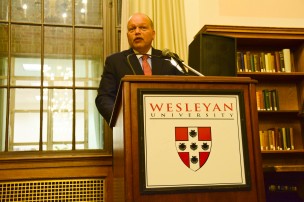
After graduating from the University over 40 years ago, Theodore M. Shaw ’76 returned to campus this week. On Tuesday, Sept. 17, he spoke to a crowd of students, faculty, and community members in the Smith Reading Room at Olin Library as part of the annual celebration of Constitution Day.
In 2005, the federal government required that any institution receiving federal funds, such as the University, must commemorate the holiday. This year, the Friends of the Wesleyan Library, a group of faculty members, community members, and library members commonly known as The Friends, approached Shaw, a lawyer and current Professor of Professional Practice at Columbia University Law School, and asked him to speak on campus in honor of Constitution Day.
According to University Librarian and member of The Friends Patricia Tully, the large turnout at the lecture was not a surprise in light of Shaw’s solid reputation at the University.
“Usually with an [alumnus] or current professor speaking, there is a draw from people who remember [him],” Tully said.
Tully added that this seminar would likely have a strong impact on students, as its goal is to expand their perspectives on racial issues and allow them to appreciate the importance of Constitution Day.
“[Shaw] is somebody who has actually been in the trenches,” Tully said. “This is somebody who went to Wesleyan and really worked through these issues since he left Wesleyan. Every time you hear someone who has managed to keep their principles and integrity through very difficult circumstances, it has to change you and inspire you.”
Shaw’s lecture, “Looking Backwards, Looking Forward: The Persistence of Race in 21st Century American Life,” focused primarily on racial issues in the United States.
“[The Constitution] is tainted and imperfect,” Shaw said. “Imperfection was manifested in what we call America’s original sin. That original sin, as we all know, is slavery.”
Shaw emphasized that though the Constitution is flawed, it is a document that binds us together.
“It belongs to all of us, and we have an obligation to embrace it and to change it if we need to,” Shaw said. “To me, it is…a document that does not stand only for the things it stood for when it was adopted, but it has to be useful today.”
Shaw also spoke about the way our country deals with its past, noting that the great dilemma lies in problems regarding race. He argued that much of this issue derives from our founding fathers, slaveholders and progenitors of slavery. He said that our country was never honest about race; rather, the Constitution is loaded with euphemistic references to slavery.
“When we think of our founding fathers and the Constitution, all of these individuals accomplished something great,” Shaw said. “But what do we make out of the framers of the Constitution? How do we reconcile what they did? We as a country collectively honor these men. They are on our dollar bills; we name institutions, cities, roads and highways after them.”
Shaw also focused on several court cases, comparing Plessy v. Ferguson (1896), which legalized “separate but equal,” to Brown v. Board of Education (1954), which integrated schools. He also spoke about the Jim Crow laws. He concluded his lecture by presenting a challenge to the students in the audience, stating that it is their responsibility to do what must be done in order to make this document continue to hold the nation together in the 21st century and beyond.
Following the presentation, Shaw held a brief question and answer session during which he spoke in more detail about public school concerns.
Henry Bushnell ’17, one of the students who attended the event, received Shaw’s remarks positively.
“I thought it was really interesting to put the Constitution in a modern and racial context,” Bushnell said.
Bulelani Jili ’16 agreed with Bushnell, though he felt the lecture was lacking in some regards.
“It was a great historical reference to equality in America,” Jili said. “However, I would have liked to hear more about the issues of inequality.”
The Friends hopes to coordinate with the annual springtime Hugo Black lecture that focuses on first amendment issues in an effort to allow students to see the common threads between racial and first amendment concerns.
Although the group has a few speakers in mind for the upcoming years, students will have to wait until next fall to find out who will be speaking in honor of 2014’s Constitution Day.
“It is always a really interesting event, and it is fun to hear what people have to say about the Constitution and that we are not just taking it straight as the Constitution,” Tully said. “Rather, we bring people in who try and make you think about the Constitution, the constitutional issues, and how it really is still a living document.”


Leave a Reply